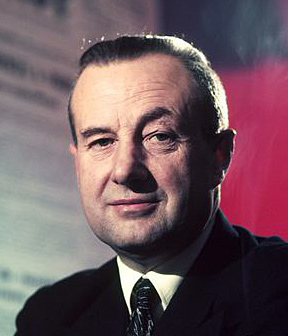Hubert Beuve-Mery
( journalist, editor) | ||||||||||||||
|---|---|---|---|---|---|---|---|---|---|---|---|---|---|---|
 | ||||||||||||||
| Born | 5 January 1902 Paris, France | |||||||||||||
| Died | 6 August 1989 (Age 87) | |||||||||||||
| Nationality | French | |||||||||||||
| Founder of | Le Monde | |||||||||||||
Founder of Le Monde. Attended Bilderberg 1970. Directed Agence France-Presse 1970-1978
| ||||||||||||||
Hubert Beuve-Méry was a French journalist, founder of the daily newspaper Le Monde and the monthly Le Monde diplomatique. He attended the 1970 Bilderberg meeting after retiring from Le Monde in 1969.
Contents
Background
Hubert Beuve-Méry was the son of Hubert Beuve-Méry (1870-1908), a watchmaker-jeweller, and Joséphine Tanguy (1876-1944), a seamstress.
Despite a difficult childhood because of the First World War, and although from a modest family, he obtained the support allowing him to pursue higher education. He studied literature and obtained a doctorate in law.[1]
In 1928, he married Geneviève Deloye (1903-1997). They had five children.
Beginnings in journalism and political engagement
Hubert Beuve-Méry acquired his first experience as a journalist by writing for Nouvelles Religieuses, a Catholic and conservative newspaper founded in 1918 by Father Marie-Albert Janvier[2], and in 1925 had his first political experience by taking part in uproars and demonstrations of the far right youth movement Camelots du Roi which aimed to prevent the appointment of the pacifist Georges Scelle to the faculty of law in Paris. He was briefly attracted by Le Faisceau of Georges Valois, the first French fascist party, which took off during the same year 1925.[3]
Having become a doctor of law in 1928, he taught law at the French Institute in Prague where he also became a technical adviser to the Ministry of Foreign Affairs of the first Czechoslovak Republic. There he studied the rise of militarist perils in Europe and also became the correspondent of several Parisian dailies, including Le Temps, which was the unofficial journal of the Foreign Ministry at the Quai d'Orsay.
In 1938, in protest against the abandonment of Czechoslovakia he resigned from his post.
Second World War
After the defeat of 1940, Hubert Beuve-Méry chose to stay in France. This initial choice will later be reproached to him by Charles de Gaulle, who went to London to organize the Resistance, who throws at him: “You are not mine”.[4]
In 1941-1942, Hubert Beuve-Méry participated, as director of studies, in the activities of the École des cadres d'Uriage, a school for executives created by the Vichy regime to provide executives in youth camps. In an article entitled “National Revolutions, Human Revolution”, published in Esprit in 1941, Beuve-Méry declared: “The revolution needs a leader, cadres, troops, a faith, or a myth. The National Revolution has its leader and, thanks to him, the main lines of its doctrine. But she is looking for her executives."
When Uriage was closed by Pierre Laval at the end of December 1942, some of its leaders, including Beuve-Méry, joined the Resistance. He took part in the Liberation battles with the maquis. In 1943-1944, he was a lieutenant in the French Forces of the Interior (FFI).
Le Monde
In October 1944, Hubert Beuve-Méry was called upon by General de Gaulle to create, with the help of the French government, a newspaper to replace the daily Le Temps, which, victim of the ordinance of September 30, 1944 on collaboration, saw its premises requisitioned and its equipment seized. This is how Le Monde was born, the beneficiary of this confiscation, the first issue of which came out on December 18, 1944, with him as director. He also founded Le Monde Diplomatique in 1954.
He supported the Constitution of the Fourth Republic in 1946, then the return of General de Gaulle to power in 1958, declaring himself strongly in favor of the Constitution of the Fifth Republic.
He nevertheless firmly opposed the adoption of the project to elect the president by direct universal suffrage, in 1962, and called, during the presidential election of 1965, to vote against the incumbent president. He became a systematic critic of Charles de Gaulle, publishing editorials under the pseudonym of Sirius, under which "he exerts a permanent criticism of the Gaullist policy", but pushing the newspaper to a policy of quality which obliges to verify and cross-check the information, and ensuring the protection of the sources of information. He calls for voting no in the 1969 referendum, which precipitates the resignation of the de Gaulle. Hubert Beuve-Méry retired six months later.[5]
He died on August 6, 1989 in Fontainebleau (Seine-et-Marne). His wife died on June 4, 1997, at age 93.
Event Participated in
| Event | Start | End | Location(s) | Description |
|---|---|---|---|---|
| Bilderberg/1970 | 17 April 1970 | 19 April 1970 | Switzerland Hotel Quellenhof Bad Ragaz | the 19th Bilderberg meeting, in Switzerland. |
References
- ↑ « HUBERT BEUVE-MÉRY » archived, Encyclopædia Universalis
- ↑ Frédéric Ploquin, Hubert Beuve-Méry : "Non à la désinformation", Arles, Isabelle Péhourticq, 2010, 95 p. (ISBN 978-2-7427-9220-7), p. 25.
- ↑ Simon Epstein, Un paradoxe français, Albin Michel, Paris, 2008, p. 417.
- ↑ Blaise de Chabalier, « Sirius, le poil à gratter du Général », Le Figaro, encart « Culture », jeudi 24 avril 2014, p 36.
- ↑ Blaise de Chabalier, « Sirius, le poil à gratter du Général », Le Figaro, encart « Culture », jeudi 24 avril 2014, p 36.
Wikipedia is not affiliated with Wikispooks. Original page source here